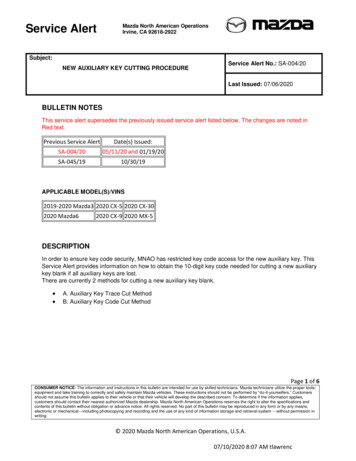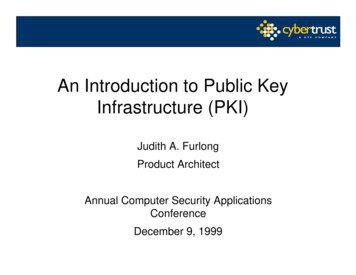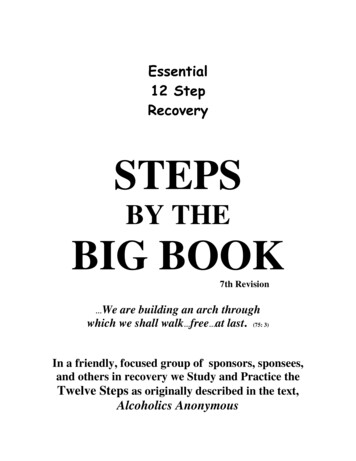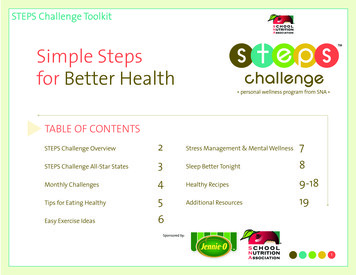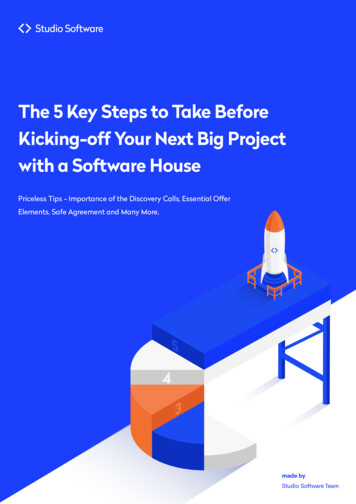
Transcription
The 5 Key Steps to Take BeforeKicking-off Your Next Big Projectwith a Software HousePriceless Tips - Importance of the Discovery Calls, Essential OfferElements, Safe Agreement and Many More.made byStudio Software Team
Table of content010203Choose the Type of Your PartnerSoftware House vs. In-house vs. Freelancer .Start an Effective Research and InvestigationWhat Is a Discovery Call? . 07-09Discovery Call - What Question You Should Expect . 10-12Make the Right ChoiceHow To Choose a Software House For Your Next Project . 14-16How IT Project Estimation Should Look Like . 17-21Software House Proposal - What You Can Expect . 22-240405Create Safe AgreementWhat Software Development Contract Should Include . 26-28Prepare For the First Kickoff MeetingHow to Conduct a Perfect Kickoff Meeting . 30-32
Choose the Type of Your Partner02
AdamCEO & Co-founderSoftware House vs. In-house vs. FreelancerLooking for the perfect team for your next IT project? Is it better to outsource or buildin house? What to consider before making a choice? Learn the pros and cons ofworking with freelancers, a software house, or building a project in house.You have a product idea and a plan for development, so it’s time to find the perfect team thatwill build your project. But which one to choose: a freelancer, a software house, or thein-house team?Different projects require a completely different approach, so you need to determine thescope of the project before you choose a solution tailored to your needs. Learn the pros andcons of each solution and make a wise decision.Working with a freelancerHiring a freelancer works well for small projects, but only if you don’t plan todevelop them in the future. So it’s better to hire a freelancer for one-offprojects, such as making a landing page or a simple static site.Software house vs. In-house vs. Freelancer03
Moreover, it’s relatively easy to find freelancers and they can usually start rightaway. They can also quickly finish a certain project and charge less than asoftware house or a full-time employee.Once a project is finished, the freelancer’s job is done. If you expect maintenance, bug fixing, or support, you will need to handle them yourself. Even if youfind a full-stack developer, it’s hard to expect one person to cover all elements,such as backend, frontend, QA, UX/UI design, etc. And managing severalfreelancers can be tricky.Plus, freelance developers sometimes work beyond working hours, which canresult in poor communication. They usually have more than one client, so theyoften work on multiple projects simultaneously. This means less commitment toa project and when they receive a better offer, they might drop out in the middleof the work.Perhaps you should hire a software houseWhen you need a full package of services managed by an experiencedteam and want to develop a product from scratch, a software house is theanswer. Such companies put huge effort into completing teams that consistof a vast range of experts who specialize in certain technologies andindustries and provide quality products and security. They are also familiarwith up-to-date technology and trends.You should consider working with a software house if you want to build a biggerapp (with a bigger budget) with complex logic or if you run a large offlinebusiness that needs IT systems to improve its performance.It’s also a good idea for companies that build online products, have their ownteams but with a limited processing capacity, or if you need to scale the teamfor some time with highly skilled people.One of the biggest concerns that you might have when outsourcing your projectto a software house could be time zone differences, but it’s often solved withthe right tools and strong communication skills.Another thing is that working with a software house comes at a higher pricethan working with freelancers, but you get higher quality based on years ofexperience. Plus, sometimes you have to wait several weeks to start a project,but when you choose one of the market leaders, it’s worth waiting.Software house vs. In-house vs. Freelancer04
In-house teamBuilding a product with in-house developers could be the best decision forcompanies that build complex IT products. Especially if the project requiresprocessing confidential data and strict access control. Outsourcing suchprojects can be risky and it’s more secure to keep it in house even if it’s moreexpensive.In-house development is also a good idea for large technology companies thatoffer products with commercial success. In such a case it’s worth investing inbuilding your own team.The in-house team is familiar with the product, thus can smoothly run long-termprojects with complicated use cases. They can also make real-time fixes andreact as soon as anything happens.If your team is small, you may need to hire more people. But, assembling a newteam can be costly and time-consuming, as it’s not easy to find the best specialists. Make sure you can afford it.Costs related to hiring developers are not only about paying salaries, but youalso need to provide equipment, tools, office space, employee benefits, etc.Add the costs of staff turnover, onboarding and training, cover for sickness,raises, dismissal management, and many more It really costs money.Over to youIt’s time to decide.If it’s a small project with minor upgrades that don’t require maintenance andthere’s no strict deadline on the horizon, hiring a freelancer should be a goodidea (and will most likely be cheaper).If you need a bigger app with a complex logic that requires project management, think about a software house or building a project in house. Consideryour team’s skills and make sure it will have time and resources to complete aproject. If not, a software house would be the best option. See our serviecesand feel free to contact us!Software house vs. In-house vs. Freelancer05
Start an Effective Researchand Investigation06
BartekProject ManagerWhat Is a Discovery Call?Your business needs a web application, so you’ve spent the time to find a softwarehouse that you consider a good fit. But how can you be sure that the vendor willunderstand your business needs? The answer is a discovery call.As a client you have hopes that the software house will help you achieve your goals. Naturally,before you sign any contract you want to make sure that the vendor will meet your businessneeds, objectives, challenges, budget, deadline, and many more things. Is it possible todetermine all the things during one call?It is, but only when it’s more than just the first conversation. And it is hidden under the termdiscovery call.What is a discovery call?A discovery call can be the most important conversation, as you only get one chance to makea first impression. Both you and the software house can assess whether you’re a good fit foreach other.So, what should the perfect discovery call consist of?Getting to know each otherFirst things first, it’s time to learn something about what you do. Help the softwarehouse understand where your company is now and what you want to achieve with theirknow-how and experience.Bearing this in mind, expect questions that will help the software house to know yourcompany inside out. The more precise you are, the easier it will be to take concrete stepstoward your goals.What Is a Discovery Call?07
Understanding your concernsUnderstanding your problems and requirements is what helps to see how the softwarehouse can potentially help. Addressing top priorities, the biggest concerns, and mainchallenges before starting the collaboration gives the software house a broaderperspective on your project so that they can estimate potential risks and evaluateexpected benefits.By asking probing questions a software house gets the full scope of your hopes thattheir solution will help you achieve. This is why you should give much longer answersthan “yes” or “no”. Open questions bring more value and success depends on thequality of both the questions and the answers.If you both agree that you are a good fit for each other, then you can discuss the nextsteps.Addressing your needsAnother step is discussing how a software house can help you address each of the painpoints you’ve mentioned before. Now it’s time to determine what the software housecan do to solve your problems and meet your expectations.Based on the discovery call, the software house aligns its services to your needs, soyou’ll be assured that they’ll work smarter and be able to address your pains.Moving onwardsExpect the vendor to guide you through the next steps, help you evaluate the project,and discuss the general terms of collaboration.After this part, you should know the details of the product based on the extra information that you provided to the software house.What is a discovery call for?The purpose of the discovery call is to see whether you and the software house share goals.Speaking on the phone or having a video call is far more effective than email correspondence.It’s an opportunity for you to verify the software house and talk about prospective collaboration.You can ask for a relevant use case if you want to make sure that the vendor has experience withsimilar projects. The same goes for the industries and markets the software house operates in,the technologies they use, etc.What Is a Discovery Call?08
Perhaps you’re looking for a company that will provide you with comprehensive services andmanage your complex business scenario that requires both web and mobile applications andmaintenance. You need to make sure that they have solid experience in applying leading technologies to be a reliable technological partner.What can also be important is the methodology their work is based on. For instance, when asoftware house operates based on the Agile approach, it’s information for you that you’ll beactively involved in the process. So ask about the work culture, technology, and approach toremote collaboration.It also helps to verify the quality of communication between you and the dev team. After all,you’re going to work together for at least several months, so effective communication is what willmake it smooth.A discovery call is a two-way conversationAs you can see, the discovery call is an opportunity to collect actionable data for both you and thesoftware house. You can verify whether the software house you consider has trusted developers,expertise in sophisticated technology, and a solid background.Even though it’s better when it’s more like a friendly conversation than an official call, it’s good tobe prepared. Take time to gather all the information that can help a software house to betterunderstand your company with all its challenges and objectives.What Is a Discovery Call?09
BartekProject ManagerDiscovery Call - What QuestionYou Should ExpectA discovery call is an in-depth conversation, so it requires asking many questionsto collect valuable insights. Hence honest and detailed answers really matter. Readon to see the questions a software house will ask during a discovery call.We’ve explained what the discovery call is and how it can help you create a successful webapp, so it’s time to learn more about the process. You know that a well conducted discoverycall leads a software house to understanding your concerns and challenges, so now it’s timeto dive deeper into the questions that you can hear during the call.What are you looking for?A software house needs to understand your concerns and obstacles or challenges you experienceto uncover the real problems. It’s also important how you’re addressing the problem today. Focuson the problems you’re trying to solve and what has driven you to find the solution.The more details you share, the better.Problems and pain pointsA software house needs to understand your concerns and obstacles or challenges you experience to uncover the real problems. It’s also important how you’re addressing the problem today.Focus on the problems you’re trying to solve and what has driven you to find the solution.Discovery Call - What Question You Should Expect10
With an answer to this question a software house can determine whether it can help youreach goals. Perhaps you have in mind a product that seems to be ideal, but, in reality,needs many improvements that you’re not aware of.Understanding your competitorsI guess you’ve made the industry and competitive analysis, so you know exactly who youcompete with and how you can compare with them. It’s also about the companies that couldbecome competitors.Tell a software house everything you can about the main competitors, why you think they do theirjob well or what they do wrong. You should also determine in what way they are similar to yourcompany and what you can learn from them.What’s your experience?Another thing that is equally important is whether you’ve worked with a similar vendor before.If yes, how did it go? What was the project about? Which methodologies were used? Whatworked best? Did you like it? Did the collaboration go as planned? And what are the main painpoints that you want to fix?Armed with this knowledge we will get a better grasp of the business situation, so it will help usdetermine whether we fit your vision.What motivates you to choose a vendor?It’s no secret that you consider several vendors to work with. This is why one of our questionscan be about what’s most important to you when choosing a software house for your project.Some of the things that you should take into consideration are a portfolio (does the vendor haveexperience with similar projects?), price, technology used by the software house, time to deliver,and much more. All of these factors influence your decision making process.Defining your internal resourcesKnowing all the capabilities within your business makes you aware of your company’s innerstrengths and weaknesses. When you ask a software house for help, it’s good to have a technicalperson on the team, as there will be important product decisions to make. And what can help tomake the collaboration smooth is having a product owner on board — someone whose decisionsare respected by your organization.It’s also good to know who else on your team will be involved in the project. All the informationwill help us to decide whether we have the resources to fill the gap.Discovery Call - What Question You Should Expect11
Generally, a software house wants to know your commitment to the project.Setting a realistic timeline of goalsWhen you set your product plans, you possibly know when you would like to be up andrunning with a solution. So what are your expectations? How long should it take to build atest product or its live version? What about the launch? Always be realistic here.We can then create a roadmap of the project together and set a timeline and deadline.How best to use your budget?It’s time to talk about the budget. You’ll be asked about how much you can spend on the project.But note that it’s not about how much money it will take to finish the project. A software houseneeds to know your key cost constraints to help them to estimate the cost and plan the budget.Perhaps the budget has been the main blocker to get the project done before. Probing questionshelp uncover the real problems.Next steps — what do you need from a software house?It’s time to identify what’s your main goal of the collaboration. At this stage it’s time to takea proactive approach and suggest the next steps clearly.Find the right fit on the discovery callQuestions asked during a discovery call are focused 100% on your needs. It’s important for avendor to identify the most critical goals, the main roadblocks, and to understand the businessdrivers.You may feel a little overwhelmed by the number of questions you will face and the details thatyou need to share, so it’s better to prepare. However, remember that it’s important to create aproduct that fully fits your business needs. It’s also an indicator of how professional is thecompany that you plan to work with.The more detailed questions you get from them, the more engaged they are to create what youwant. All that sets you up for success and helps to establish realistic expectations.Discovery Call - What Question You Should Expect12
Make the Right Choice13
KarolCTO & Co-founderHow To Choose a Software HouseFor Your Next ProjectChoosing a software development company can be a challenging decision.It should be preceded by thorough research, as it impacts the final effects ofyour IT product. Here’s how to choose a software house for your next project.There are some major things to consider before choosing a software house that will be the rightfit for your business. It’s crucial to make a well-thought-out decision, as you’re going to workwith a vendor for at least several months.Read on to learn more about how to choose a software house that will make your project a success.A software house that understands your business needsFirst, you need to specify your needs, determine your business goals, and set a realisticplan for product launch. Is your project web, mobile, or custom? Does it require a smallteam or a large group of developers? What technology is needed?The more details you share with a software house, the easier it will be to decide whethera project team can answer your needs.If you know what technologies your project requires, you can choose a vendor based ontheir technology stack. However, if you’re not familiar with technology, a decent softwaredevelopment company might help you choose the best technology for your app idea.How To Choose a Software House For Your Next Project14
Find a vendor that will make an effort to understand your current market situation,business goals, and objectives. You need a software development partner that will meetyour expectations in every aspect concerning a project.Transparency at the forefrontA trustworthy company will provide you with fair answers to all your questions. Top companiesknow when to say ‘No’ to a potential client, as they are aware of their limits and their main goalis a successful product launch to grow your business performance.Expect them to inform you about any issues or problems that may arise — this proves thata vendor is honest with you. You should be kept in the loop at all times.A software house should explain the costs included in its project cost estimation, so you knowexactly what you pay for. But, even if you have a limited budget, focus on the real cost. Keep inmind that the cheapest option doesn’t mean the best and the cheapest offer may mean endingup paying even 2-3 times more for the final project.When a software development company you’re considering working withprepares a cost estimation in one day without thorough research, it should setalarm bells ringing. It needs to be based on a deep analysis of the project andmany detailed questions asked by a project team.A decent onboardingHow will your cooperation start? Does a software house organize workshops for your team?Perhaps the company will guide you on how to prioritize tasks and how to use projectmanagement tools.It’s important to find a software house that will explain to you the differences between themethodologies used to create your project, help you understand the entire process, and give youclear guidelines.You need to know how your project is going to be handled — the more details a software houseshares with you, the better control you have over the IT project. Not to mention you’ll feel morecomfortable working with them.Moreover, ask for a software house’s approach to remote work, project management, andcommunication to ensure the work will go smoothly.How To Choose a Software House For Your Next Project15
Check their experience and clients’ reviewsIt’s no question that you’re more likely to trust someone with a proven track record andexpertise. This is why reliable software development companies keep examples of theirprevious work on their websites.Go to the portfolio section and look for similar applications. If the development team hasexperience in such projects, there are bigger chances that a company will better understandyour business goals.Check testimonials on a software house website and look for more information on reviewsites, such as Clutch (you can see our reviews here), where you can find the company’sreferences, reviews, clients, and experience. It will give you broader knowledge of whatthey can do.How to choose a software house? There’s even moreThere are some other indicators that can help you differentiate trustworthy software development companies from bad ones.Pay attention to whether a vendor asks a lot of questions. Of course, the number and complexityof questions may depend on your requirements. Note that the more questions a software houseasks, the more engaged it is.What can also help you in making a decision is whether a software house offers app maintenance and technical support, besides delivering the final product.There you have it. When you base your investigation on given pieces of advice, you’ll be able toselect the right partner for your project that has experience in developing apps similar to youridea.Good luck!How To Choose a Software House For Your Next Project16
BartekProject ManagerHow IT Project EstimationShould Look LikeQuoting the final price of a project that doesn’t exist sounds like trying to predict the future. So how do you know that the IT project cost estimation is donethe right way?As project cost estimation comes with risks that might bring unexpected costs, it needs to bebased on deep analysis of the project, related data, technology, team velocity, and many otherfactors.There are various techniques for calculating the cost of software development. This article willshow you how we do it at Studio Software.The accuracy of project cost estimationThe more details we have from you, the easier it is to calculate your software development costsand hours. Our experience shows that clients usually aren’t clear about the requirements whenthey ask us for an estimation of the cost of their projects.How IT Project Estimation Should Look Like17
We draw a quotation based on our framework, but besides standard indicatorswe also include two things that matter for precise estimationFEATUREAssessment of the specifications123How precise is the estimation123The first one is an assessment of the specifica-Another one is prediction of how precise andtions you deliver to us. We use a 3-point scale. 3accurate is the project estimation. Here we alsois for top project specifications that make us fullyuse a scale from 1 to 3 and the outcome is basedunderstand your problems, needs, and expecta-on what you provided and how complex is thetions, while 1 is for specifications that lackproject. Then we operate based on our experien-details.ce, so we take previous similar projects with theircost and time data to estimate your project.And what about projects that we’ve never done before? We estimate the features based onour expertise, define the scope of work, and the technology that will have to be used. Thenwe can estimate the time we need to build such solution.Our figures come with notes, so you always know why they have a low or high rating. Overall, itall depends on the quality of information we have from you, so we need fully outlined requirements for more precise estimates. If we get napkin notes, you can’t expect exact pricing.So before we create any cost estimate and detailed budget we organize a discovery call togather key project information. Specific questions help us get deeper knowledge of yourproject’s scope, timeframe, and expected outcome. questions help us get deeper knowledge ofBackend and frontend developers take part in the entire valuation process (as they can evaluateaccurately based on their experience), and then they ask another technical person to verify theirestimations.When we’re provided with all the details, we can draw up final estimates. This is why we use anExcel file to keep it all crystal clear so that you can see what the exact numbers mean.How IT Project Estimation Should Look Like18
Cost estimation — what to expect from your potentialtechnology partnerIt’s worth mentioning that you should expect a ballpark estimate rather than an accurate finalprice. It’s because most of the features can be interpreted in various ways, especially at thebeginning when the project details are only on paper.In-house development is also a good idea for large technology companies that offer productswith commercial success. In such a case it’s worth investing in building your own team.The process is called estimation, not exactimation.Phillip G. ArmourIt’s about predicting the resources, so these are not only the technology costs, but also timeand people. Many other factors affect the final price as well, such as the time for architectureplanning, bug fixing, project management, meetings, etc., so you need to determine whetherthe estimation is to include the following things:Manual or automated unit testingYou need to agree with a software house what % of total project time shouldbe allocated to QA.Project managementIs it included in your project? Note that it usually takes 10-15% of the budget.Team meetingsThey are important to keep everyone involved in the project on the same page.It takes time to set all the details, so meetings can take up to 10%.Setting up new environments, making project analyses, deployment etc.Is it included in your project? Note that it usually takes 10-15% of the budget.How IT Project Estimation Should Look Like19
Nonfunctional requirements for the projectIf there are such requirements, they need to be agreed before we start thevaluation. Do we need to run a load test to find problems before they impactusers? Perhaps you want your application to automatically scale dependingon its needs. Load balancing traffic requires adding more servers, so then weneed to use relevant solutions that also cost money. The same goes forthird-party requirements, etc.Before providing the final estimation we also need to know whether the project requiresunfamiliar technologies. We analyze potential risks and issues. You will receive a customestimate created after all the thorough research.Of course, we want to know your terms and budget restrictions, but the scope of a projectshould determine its budget. If it’s done the other way, it may lead to a project that doesn’tmeet requirements.So if a software house gives you the exact price, it should set off alarm bells in your head. Thesame should apply if you’re only provided with the price for features mentioned in your projectdescription. Giving a fixed price without in-depth analysis of the project, a number of calls,and a kickoff meeting is impossible. What you should get is range value.Be aware of underestimationOne of the most challenging things during cost estimation is to strike a balance between overand underestimating. IT projects tend to be underestimated and it doesn’t impact only costs.It’s also related to time or technical complexity. PMI’s 2018 findings show that only 57% ofprojects are finished within their initial budgets.It’s no secret that underestimation of IT project costs is a common mistake made by agenciesand it is a problem occurring on a larger scale. It’s mostly because of underestimating featuresthat look easy to develop, but require hours of development, known as SMOP (small matter ofprogramming).This is why we put such emphasis on asking probing questions during a discovery call to get asmany detailed answers from you as possible. This ensures that every estimation is near the finalprice.And guess what? Every time we are about to make a IT project cost estimation, Hofstadter’s lawsprings to mindHow IT Project Estimation Should Look Like20
Hofstadter’s Law: It always takes longer than you expect, even when you take Hofstadter’sLaw into account.Project cost estimation is easier said than doneThe exact specification is essential to reduce development costs. This is why the evaluationshould always be preceded by thorough research based on key project information gatheredduring meetings. All of them help to evaluate work hours, product complexity, team commitment, technology, and more.Big projects that come with a number of variables and functionalities require a detailed roadmap. Hence you shouldn’t expect to get an exact price. But if you get an estimation, it will helpyou decide whether the project will be feasible.How IT Project Estimation Should Look Like21
KarolCTO & Co-founderSoftware House Proposal - What You CanExpectThere are several good practices that the development team should adopt toprovide you with a precise estimation. The more details are included, the better,as it determines the success of your final project. So, what should a softwarehouse proposal look like?A decent proposal should contain a number of details, such as project management methodology,roles, budget, technology, timeline and more. Here is the key information that you can find in asoftware house proposal.MethodologyIt is important to include a methodology for establishing software process development inthe proposal. You know how the team works and what the p
ment, think about a software house or building a project in house. Consider your team's skills and make sure it will have time and resources to complete a project. If not, a software house would be the best option. See our servieces and feel free to contact us! If your team is small, you may need to hire more people. But, assembling a new







